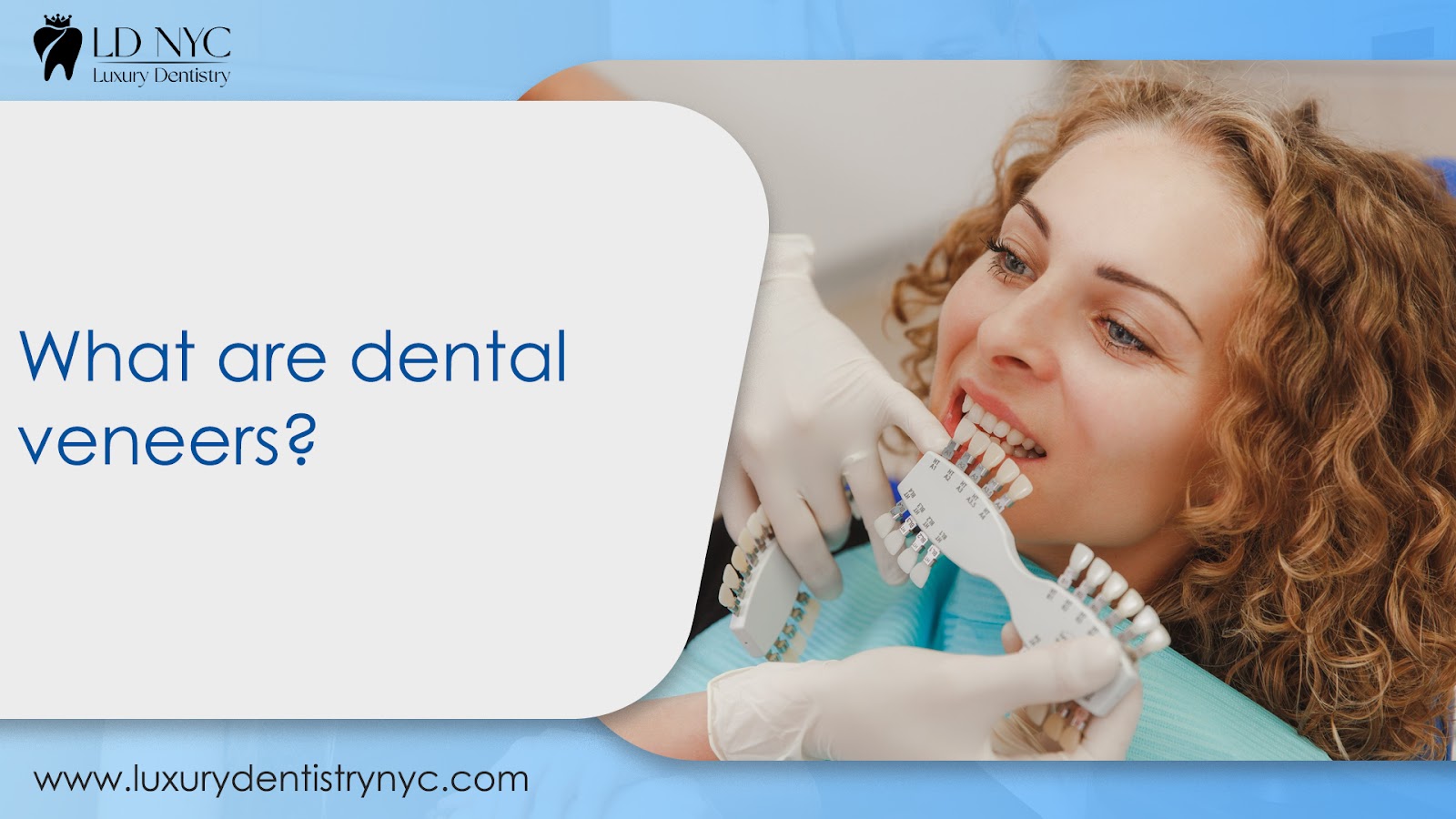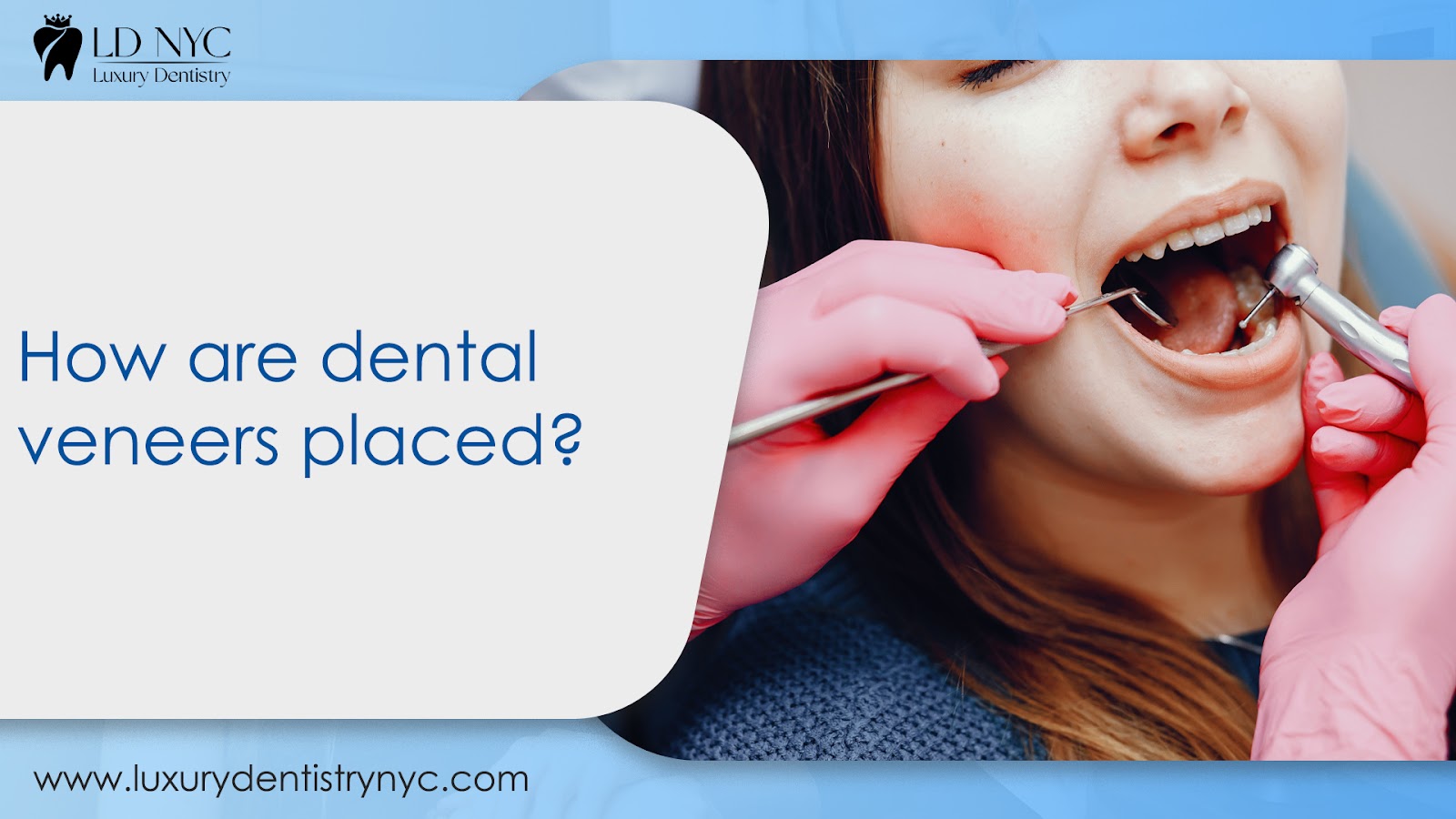Many dream of having a perfect set of teeth, but only some are gifted with it. Many people must undergo dental procedures to get the ideal smile they want. One of the popular and effective solutions for this problem is dental veneers. Dental veneers are shells placed on the front side of your teeth to improve their appearance. They are permanent solutions and can last for several years.
This blog post will discuss everything you need to know about getting the perfect smile with dental veneers.

Table of Contents
ToggleWhat are dental veneers?
Dental veneers are a popular cosmetic dentistry treatment that has been helping people achieve their dream smile for years. They are made of porcelain or resin material and are custom-made to match the color of your natural teeth. Dental veneers can correct their shape, size, and color by placing them on the front surface of your teeth, effectively treating various dental conditions like chipped, broken, or stained teeth.
Dental veneers may be the perfect solution for you, whether you want a Hollywood smile or a simple enhancement to your teeth. They are a highly effective and long-lasting option that can enhance your confidence and quality of life.
 How are dental veneers placed?
How are dental veneers placed?
Step 1: Consultation with Your Dentist
The first step in getting dental veneers is to consult your dentist. During this visit, you’ll discuss whether dental veneers are a good option for you, and your dentist will explain the process in detail.
Your dentist will examine your teeth, take X-rays, and make impressions of your teeth to create a model of your mouth. This model will design your veneers and ensure a perfect fit.
Step 2: Preparation of Your Teeth
A thin enamel layer must be removed from your teeth before dental veneers are placed. This is done to make room for the veneers so your teeth don’t appear bulky or unnatural. To numb the area, your dentist will use a local anesthetic and remove the enamel. Afterward, an impression of your newly prepared teeth will be taken.
Step 3: Creation of Your Veneers
Once your teeth are prepared, your dentist will send the imprints to a dental lab to create your veneers. It typically takes a few weeks for dental veneers to be fabricated. During this time, your dentist will provide you with temporary veneers to wear.
Step 4: Placement of Your Veneers
When your veneers are ready, your dentist will check the fit of the veneers before placing them. Your dentist will apply a special adhesive to the veneers and place them onto the prepared teeth.
Once the veneers are in place, your dentist will utilize a special curing light to harden the adhesive, ensuring a strong bond between the veneer and the tooth. Any excess adhesive will then be removed, and final adjustments will be made to perfect the fit.
Step 5: Follow-Up Visit
After placing your veneers, you must schedule a follow-up visit with your dentist to ensure they function correctly. Your dentist will check the veneers’ fit, color, and shape to ensure they meet your expectations.
In addition, your dentist will provide instructions on the proper care and maintenance of your veneers.
What are the advantages of dental veneers?
Dental veneers offer many benefits, such as:
Durability
Durability is always a concern when investing in dental procedures; veneers are no exception. Veneers are designed to be durable and long-lasting, with an average lifespan of 10-15 years.
With their strong and sturdy composition, veneers resist common dental issues like staining, chipping, and cracking.
Corrects Cosmetic Issues
Dental veneers can fix cosmetic issues, such as stained or discolored teeth, uneven or misaligned teeth, gaps, and chips or cracks. These issues can make you feel self-conscious and affect your overall confidence.
Veneers give you a flawless and natural-looking smile that boosts your self-esteem and improves your overall appearance.
Minimal Enamel Reduction
One of the primary concerns of dental patients when it comes to cosmetic procedures such as veneers is the removal of healthy tooth enamel.
Thanks to advances in dental technology, veneers now require minimal enamel reduction, which makes them a more conservative option for those who want to improve their smile without sacrificing their teeth.
Improved Oral Health
Veneers not only correct cosmetic issues but can also help restore proper dental function. For example, misaligned or uneven teeth can make it difficult to chew food properly, resulting in digestive issues.
Veneers can restore the proper alignment of your teeth, allowing you to chew food more effectively and improve your oral health.
Non-Invasive
Veneers are considered a non-invasive cosmetic dental procedure. They do not require any anesthesia, making them a more comfortable and pain-free option than other cosmetic treatments such as dental implants.
Better Protection for Your Teeth
Dental veneers not only give you an aesthetic upgrade, but they also offer more profound fortification to your teeth. They work as an additional defense against teeth sensitivity and can help reduce the risk of further damage to your teeth due to wear and tear. Veneers can also keep your teeth from becoming impacted, fractured, or chipped.
6. Aesthetic Appeal
Finally, dental veneers are a cosmetic upgrade that can transform your look entirely.
Whether you have chipped, discolored, or uneven teeth, you can achieve the perfect smile with the dental veneers you’ve always wanted.
They are created to fit your teeth perfectly so they look as natural as possible. You’ll be surprised at how their natural look can improve your overall appearance.
What are the disadvantages of dental veneers?
While dental veneers offer many benefits, there are also some downsides to consider, such as:
Damage to Natural Teeth
If you opt for dental veneers, prepare to have your natural teeth prepped for the procedure. This consists of removing a thin layer of enamel from your teeth. While this is done to create space for the veneers, your teeth will never be the same once this process is complete. You will always need to wear veneers to achieve the perfect smile, and if you decide to remove them in the future, you will likely have sensitive or damaged teeth.
Expensive
One of the drawbacks of dental veneers is that they are costly. The cost can vary depending on the quality of the materials, the dentist’s expertise, and the location.
Additionally, they are considered cosmetic procedures, meaning you must pay for them out of pocket since most insurance plans do not cover them.
Potential tooth sensitivity –
After getting veneers, you may experience temporary or permanent tooth sensitivity. This is because the dentist removes a small amount of your enamel to place the veneers adequately during the veneer installation process.
While this process is necessary for optimal results, it can cause sensitivity to hot or cold sensations. This sensitivity can sometimes last for a few days, but in others, it can be permanent.
Not Reversible
Another disadvantage of dental veneers is that it is a non-reversible procedure. Once your tooth enamel is removed from the veneer, it cannot grow back. Therefore, even if you decide to remove the veneers, your teeth will never be as strong as they were before the procedure.
Additionally, dentists cannot simply remove veneers without resorting to other treatments, like new veneers or crowns.
Increased Risk of Decay
Veneers require a significant amount of tooth enamel removal, which can weaken your teeth and make them more vulnerable to decay. The amount of enamel removed may vary based on the type of veneer and the tooth’s location.
Still, the intervention permanently alters the tooth’s natural protective layer, increasing the likelihood of bacterial infection and tooth decay.
Not Suitable for all Patients
Dental veneers are inappropriate for some patients, including those with significant teeth decay, gum disease, or weakened or cracked teeth. A full-mouth reconstruction or other treatment options may be required before veneers can be applied.
Requires Maintenance
While veneers are stain-resistant, they still require maintenance like any other dental procedure. Porcelain veneers require special care, such as refraining from chewing hard items like ice and avoiding foods and drinks that can cause staining.
Depending on their quality and care, veneers may need replacing after 10-15 years.
Conclusion
Dental veneers can be a great solution for anyone who wants to achieve a perfect set of teeth. They offer many advantages, such as improved appearance, durability, minimal invasiveness etc. However, it’s essential to consider the potential downsides, such as cost, irreversibility, sensitivity etc.
Discussing your options with your dentist is always a good idea before making decisions about your dental health. So, if you are unhappy with the appearance of your teeth, consider dental veneers as a viable solution to get that perfect smile you deserve!

Dr. Steven Davidowitz, also known as “Dr. D” by his patients, is one of the Upper East Side of NYC Manhattan’s leading cosmetic dentists that specialize in designing and maintaining beautiful smiles.


 How are dental veneers placed?
How are dental veneers placed?










